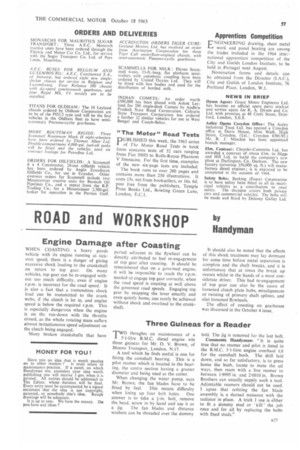ROAD and WORKSHOP b y
Page 59

If you've noticed an error in this article please click here to report it so we can fix it.
Handyman Engine Damage after Coasting
WHEN COASTING a heavy goods vehicle with its engine running at tickover speed, there is a danger of giving excessive shock loading to the crankshaft on return to top gear. On many vehicles, top gear can be re-engaged without too much difficulty, even if engine r.p.m. is incorrect for the road speed. It is also a fact that a tremendous shock load can be transmitted to the crank webs, if the clutch is let in, and engine speed is below the required r.p.m. This is especially dangerous when the engine is on the run-down with the throttle closed, as the whole rotating mass suffers almost instantaneous speed adjustment on the clutch being engaged. Many broken crankshafts that have parted adjacent to the flywheel can be directly attributed to bad re-engagement of top gear after coasting. It should be remembered that on a governed engine, it will be impossible to reach the r.p.m. needed to engage top gear correctly, when the road speed is coasting at well above the governed road speeds. Engaging top gear by snapping the lever smartly and even quietly home, can rarely be achieved without shock and overload to the crankshaft. It should also be noted that the effects of this shock treatment may lay dormant for some time before metal separation is complete and the shaft breaks, and it is unfortunate that at times the break up occurs whilst in the hands of a most considerate driver. This bad re-engagement of top gear can also be the cause of loosened clutch plate hubs, misalignment or twisting of primary shaft splines, and also loosened flywheels. The effect of coasting on gearboxes was discussed in the October 4 issue.




































































































































